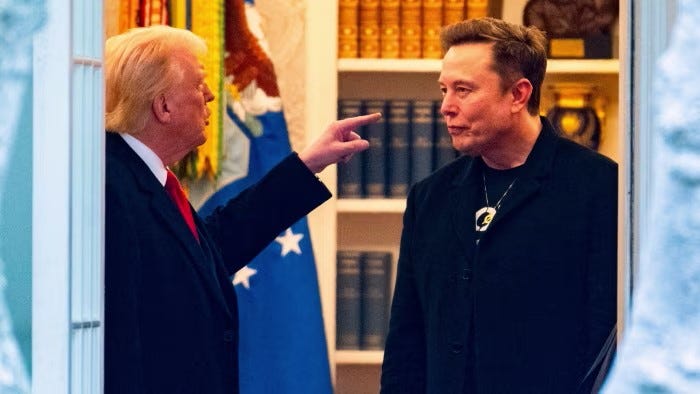Tesla (TSLA) Loses $150B as Trump Turns on Musk: What's at Stake for SpaceX and xAI | Markets Insider
The public fallout between President Donald Trump and Elon Musk is creating new risks for investors tied to Musk’s business empire. The two had a close relationship after the 2024 election, but it unraveled quickly after Musk criticized Trump’s tax-and-spending bill. The consequences could impact Tesla (TSLA), SpaceX, and xAI, particularly in areas where federal contracts and political goodwill are involved. Meanwhile, since the family feud began to take shape, TSLA stock is down over 14% in the last five days.

As stated above, Tesla stock dropped over 14% on Thursday, wiping out about $150 billion in market value in one day. Shares recovered about 4% on Friday, but the damage is a reminder of how sensitive TSLA is to political and regulatory news. Tesla relies on supportive policies for electric vehicles. This includes access to clean energy subsidies, favorable emissions regulations, and potential federal support for autonomous driving.
Tesla earns hundreds of millions of dollars each quarter from regulatory credit sales to carmakers that need to meet emissions targets. If Trump follows through on weakening emissions standards, those credits become less valuable. Congress has already voted to eliminate California’s right to set stricter emissions rules. That alone could reduce Tesla’s credit revenue over time.
On autonomy, the situation is also uncertain. Tesla plans to launch its first self-driving taxi service in Austin this month. But federal regulations still lag, and Musk had been pushing for nationwide standards. Losing influence in Washington could slow that progress.
SpaceX is deeply connected to the federal government. It launches astronauts for NASA, handles satellite payloads for the Pentagon, and works with the intelligence community.
Trump now says he’s considering revoking government contracts with Musk’s companies. That would hit SpaceX hard. NASA awarded SpaceX contracts worth nearly $5 billion for crewed space station flights. Another $4 billion is earmarked for the Starship moon program. The company also won an $843 million contract to help deorbit the space station.
The Department of Defense and National Reconnaissance Office are also customers. In April, SpaceX secured a $5.9 billion contract to launch national security payloads. The NRO has a $1.8 billion classified deal in place as well.
Any disruption to these deals could delay missions and create funding gaps. SpaceX is also hoping to participate in the Trump administration’s missile-defense program, but that may now be off the table.
Musk’s AI startup xAI is trying to raise $5 billion in debt and $300 million in equity at a $113 billion valuation. Morgan Stanley is leading the deal. Investors had shown interest, but the Trump–Musk feud is creating new concerns.
The loans were expected to sell for close to 100 cents on the dollar. But after the feud went public, they dropped to 95 cents, then rebounded to around 97 cents. Morgan Stanley may now need to offer higher interest rates or discounts to complete the deal. The original plan was to sell some of the debt at a 12% rate, which already signaled a high level of risk.
xAI is also burning cash. The company posted a Q1 loss of $341 million before interest, taxes, depreciation, and amortization. It expects to break even in the coming years, but rising borrowing costs could extend that timeline.
According to The Street’s analysts, Tesla is Hold, with an average TSLA price target of $285.91. This implies a 3.13% downside.

This feud introduces a new variable: political risk across Musk’s portfolio. Tesla, SpaceX, and xAI all benefit from regulation, federal partnerships, and investor confidence in Musk’s ability to work with Washington.
If those ties fray, investors may need to rethink how they price these companies. This includes discounting future growth expectations and accounting for higher volatility. For now, Musk-linked assets are under pressure, and the political spotlight isn’t fading. Investors will be watching what happens next.











